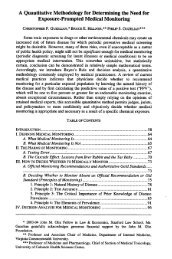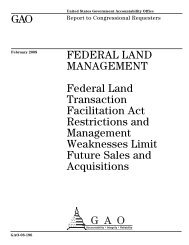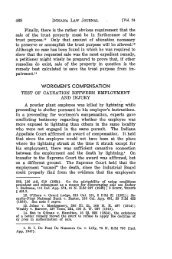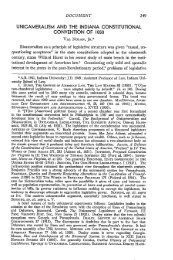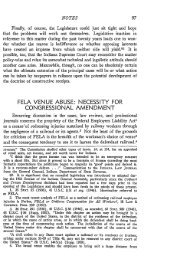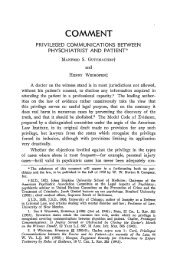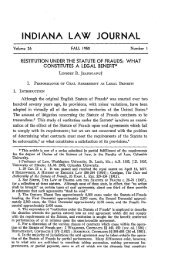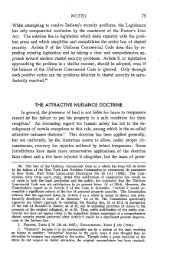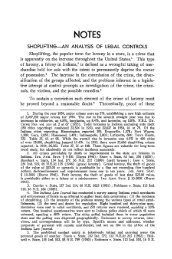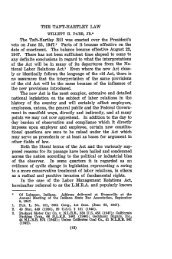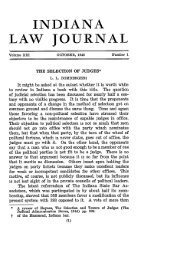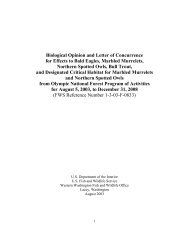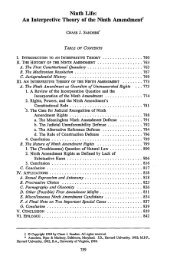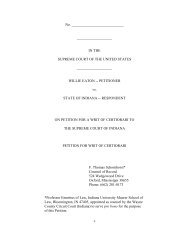constitutional aspects of state extradition legislation - Indiana Law ...
constitutional aspects of state extradition legislation - Indiana Law ...
constitutional aspects of state extradition legislation - Indiana Law ...
You also want an ePaper? Increase the reach of your titles
YUMPU automatically turns print PDFs into web optimized ePapers that Google loves.
NOTES<br />
<strong>legislation</strong>, thus avoiding the necessity to define the limits <strong>of</strong> national<br />
power, the extent to which it has been exercised, and the determination<br />
as to whether <strong>state</strong> <strong>legislation</strong> conflicts. In other words, no limitation<br />
upon <strong>state</strong> power would be implied from the <strong>extradition</strong> clause <strong>of</strong> the<br />
Constitution.<br />
Superficially, such an interpretation seems radical for it apparently<br />
gives the <strong>state</strong>s unrestricted authority to legislate in this field, including<br />
the power to replace a well-established system <strong>of</strong> <strong>extradition</strong>. But no<br />
grounds may be posited which support an implication that the <strong>state</strong>s<br />
would abuse this power; existing uniform <strong>state</strong> laws have been <strong>of</strong> material<br />
benefit. Moreover, merely because the <strong>extradition</strong> clause places no<br />
limitation on the <strong>state</strong>s, it does not follow that the <strong>state</strong>s have unfettered<br />
power. The due process clause <strong>of</strong> the Constitution could feasibly be used<br />
to check the use <strong>of</strong> questionable rendition <strong>legislation</strong>. Though no<br />
Supreme Court decisions establish this function <strong>of</strong> due process, its<br />
possible application has been recognized, at least, by <strong>state</strong> courts. 31<br />
Should <strong>state</strong> <strong>legislation</strong> result in grave injustice, the due process concept<br />
could be utilized to prevent its operation, for it is well established that<br />
<strong>state</strong> action not consonant with basic standards <strong>of</strong> justice is a denial<br />
<strong>of</strong> due process <strong>of</strong> law. 32 That some <strong>state</strong>s might so act is not mere conjecture.<br />
A. compact entered into by Kansas, New Mexico, Colorado, and<br />
Wyoming 3 stipulates that the <strong>of</strong>ficers <strong>of</strong> any <strong>of</strong> these <strong>state</strong>s in pursuit<br />
<strong>of</strong> an alleged criminal may cross the borders <strong>of</strong> any other member <strong>state</strong><br />
to arrest and return him without resorting to <strong>extradition</strong> proceedings."<br />
If the effect <strong>of</strong> this agreement is to legalize the removal <strong>of</strong> a supposed<br />
31. People v. Ruthazer, 98 N.Y.S.2d 104, 107 N.E.2d 458 (1952); Pierce v. Smith,<br />
31 Wash.2d 52, 195 P.2d 112 (1948).<br />
32. Gibbs v. Burke, 337 U.S. 773 (1949); Ashcraft v. Tennessee, 322 U.S. 143<br />
(1943).<br />
33. COLO. STAT. ANN. c. 153, §§44(1)-(5) (1935). Officers <strong>of</strong> member <strong>state</strong>s<br />
are allowed to arrest:<br />
"(a) While in pursuit <strong>of</strong> any person who has committed a felony in said <strong>state</strong>; or<br />
(b) While in pursuit <strong>of</strong> any person who had been charged with the commission<br />
<strong>of</strong> a felony in said <strong>state</strong>; or<br />
(c) While in pursuit <strong>of</strong> any person who escaped from custody <strong>of</strong> any penitentiary,<br />
jail. .. ."<br />
Under these situations <strong>extradition</strong> is waived and <strong>of</strong>ficers <strong>of</strong> the compacting <strong>state</strong>s<br />
are authorized to make an arrest and removal <strong>of</strong> a person. See discussion by THE<br />
COUNCIL OF STATE GOVERNMENTS, op. cit. supra note 7, at 4-6.<br />
34. The UNIFORM FRESH PURSUIT AcT § 2, allows arrest by <strong>of</strong>ficers, but requires<br />
that a magistrate determine the lawfulness <strong>of</strong> the arrest, and that the alleged criminal<br />
be held for <strong>extradition</strong>. See discussion by THE COUNCIL OF STATE GOVERNMENTS,<br />
op. cit. supra note 7, at 1-7. Examples <strong>of</strong> the Uniform Fresh Pursuit Act may be found<br />
in CAL. PEN. CODE §§ 852-852.4 (1949); IND. ANN. STAT. §§9-451-9-458 (Bums<br />
Supp. 1951); IOWA CODE ANN. c. 756, § 1 (1951); MIcH. Comp. LAws §§ 780.101-<br />
780.108 (1948).




